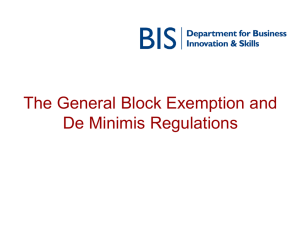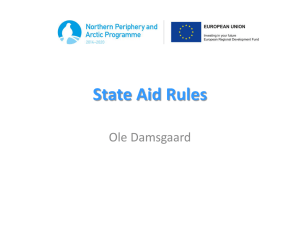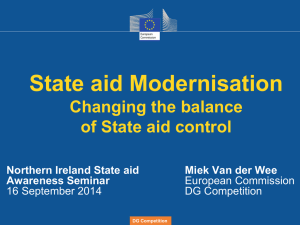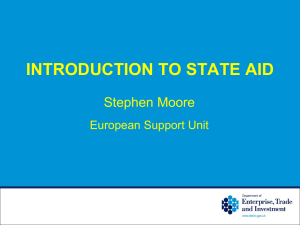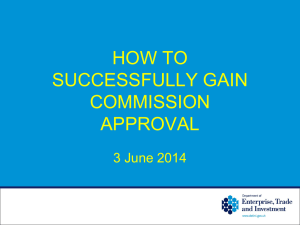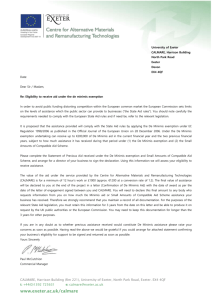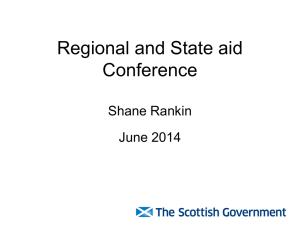De Minimis
advertisement
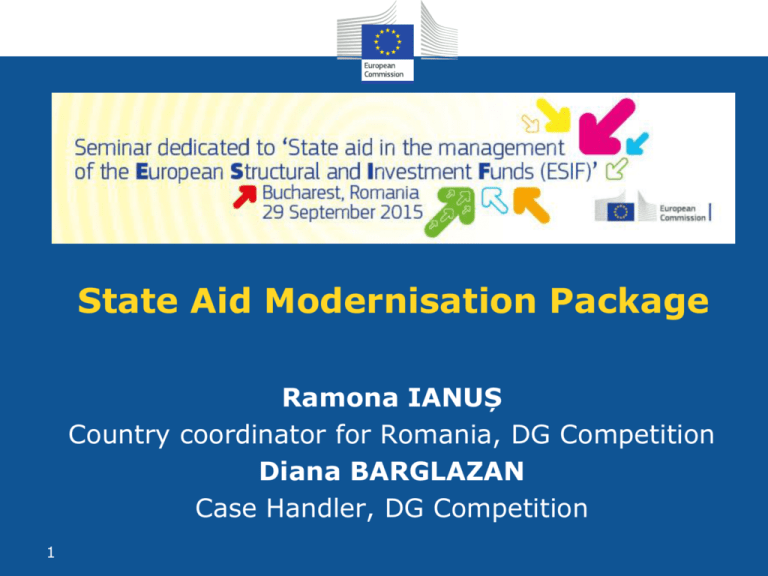
State Aid Modernisation Package Ramona IANUȘ Country coordinator for Romania, DG Competition Diana BARGLAZAN Case Handler, DG Competition 1 Overview 1. Main objectives of SAM and role of Member States 2. De Minimis 3. General Block Exemption Regulation 2 SAM – Main objectives • Foster growth in a competitive internal market • Facilitate the granting of “good aid” (Europe 2020) • Discourage ineffective or counter-productive aid • Focus enforcement on cases with biggest impact • Less ex ante control of potentially less distortive aid • Emphasis on ex post monitoring, evaluation & transparency • Streamline rules and speed up decisions • Simplification and harmonisation of rules • Improvement of procedures Impact 1: Facilitating 'good aid' Notification (guidelines/Treaty) notified (guidelines/Treaty) •Notified aid •Block-exempted GBER extended (notification and intensity threshold) Aid amount •De minimis Existing GBER GBER extended (new types and categories) GBER extension De minimis minimis De Type of aid 4 Impact 2: Stricter control of "bad aid" Assessment of potentially more distortive types of aid on the basis of "common assessment criteria": • contribution to a well-defined objective of common interest • need for state intervention • appropriateness of the aid measure • incentive effect • proportionality of the aid (aid limited to the minimum necessary) • avoidance of undue negative effects on competition and trade between Member States Impact 3: shift of Ex Ante control to Ex Post control • Smaller proportion of aid will be scrutinised by EC • Aid under GBER • Awards under approved aid schemes • Shift from ex ante control to : • Ex Post Evaluation • Ex Post Monitoring • Transparency Impact 4: Ex Post - Evaluation • Purpose: Monitoring Evaluati on Impleme n-tation Design Assessment and approval Improve quality of public expenditure • Scope: Large schemes • Evaluation questions: ● Did the aid alter behaviour of beneficiaries? ● Were the objectives of the aid achieved? • Independent evaluator Impact 5: Ex post - Monitoring • Ex Post Monitoring since 2006 • 221 schemes monitored • 28% of monitored schemes found to be problematic • Widening of GBER will be accompanied by increased monitoring efforts Impact 6: Ex Post - Transparency • Purpose: • Improve accountability of public spending • Promote compliance (enables firms to verify legality of aid granted to competitors) • Publication on Central/Regional website of • Full text of aid scheme or aid granting decision • Identity of granting authority • Info on individual aid awards > € 500,000: Identity of beneficiary, aid amount, date of granting, NUTS 3 region, NACE code Impact 7: New Partnership with MS • Extension of GBER Increased responsibility for MS • Implementation aid measures without ex ante control by EC • Need to ensure effective control at national level • Strengthen EC-MS partnership • • • • Country Coordinator Network in COMP High level Country visits Case Portfolio approach Guidance on new rules High Level Forum + Working Groups • WG on SAM implementation (GBER, Best Practices…)) • WGs on specific topics (EEAG) DE MINIMIS Regulation 1407/2013 11 General • Concept: de minimis aid does not constitute State aid: it is deemed too small to affect trade or distort competition and thus not fulfilling all the criteria of Article 107(1) TFEU • Scope: (article 1): exclusion of: Certain sectors: fisheries, agriculture, coal, acquisition of road freight transport vehicles granted to undertakings performing road freight transport for hire or reward Export aid (directly linked to quantities exported, establishment and operation of a distribution network or other current expenditure linked to export) Aid contingent upon the use of domestic over imported goods 12 Conditions: firms in difficulty New provisions are applicable to enterprises in difficulty: Enterprises in difficulty are no longer excluded from the scope of the de minimis Regulation. However, the “safe harbours” for the calculation of the gross grant equivalent (amount of State aid) included in guarantees and loans are only applicable to enterprises that are in a position to repay such loans in the meaning that: • the beneficiary is not subject to collective insolvency proceedings nor fulfils the criteria under its domestic law for being placed in collective insolvency proceedings at the request of its creditors • in case of large undertakings, the beneficiary is in a situation comparable to a credit rating of at least B-. 13 Conditions: Amount of aid (Article 3) Ceiling: the total de minimis aid per undertaking does not exceed EUR 200 000 over any period of three fiscal years (road transport: EUR 100 000) rolling period (current and previous two fiscal years before the date of granting) date of granting: moment the legal right to receive the aid is conferred on the undertaking under national law (≠ payment) if the ceiling is exceeded the whole amount cannot benefit from the Regulation, not even the fraction below the ceiling per single undertaking 14 Conditions: Single undertaking The de minimis treshold applies per "single undertaking" (Article 2 (2)): Single undertaking includes, for the purposes of the de minimis Regulation, all enterprises having at least one of the following relationships with each other: » (a) one enterprise has a majority of the shareholders’ or members’ voting rights in another enterprise; » (b) one enterprise has the right to appoint or remove a majority of the members of the administrative, management or supervisory body of another enterprise; » (c) one enterprise has the right to exercise a dominant influence over another enterprise pursuant to a contract entered into with that enterprise or to a provision in its memorandum or articles of association; » (d) one enterprise, which is a shareholder in or member of another enterprise, controls alone, pursuant to an agreement with other shareholders in or members of that enterprise, a majority of shareholders’ or members’ voting rights in that enterprise. Clarification: Enterprises which have no relationship with each other except for the fact that each of them has a direct link to the same public body or bodies are not treated as being linked to each other and shall therefore not be considered as a "single undertaking" (Recital 4) 15 Conditions: Transparent aid Regulation applies only to de minimis aid for which it is possible to calculate precisely the gross grant equivalent ex ante without any need to undertake a risk assessment ("transparent aid"). Loans: 2 alternative calculation possibilities: New „Safe harbour“ thresholds: the loan is secured by collateral covering at least 50 % of the loan; and the loan amounts to either EUR 1000000 over five years or EUR 500000 over 10 years; if a loan is for less than those amounts and/or is granted for a shorter period, the gross grant equivalent of that loan shall be calculated as a corresponding proportion of the ceiling the gross grant equivalent has been calculated on the basis of the reference rate applicable at the time of the grant. Aid taking the form of equity or quasi-equity investments shall only be considered as transparent de minimis aid if the capital provided to a single undertaking does not exceed the de minimis ceiling. 16 Conditions: Transparent aid Guarantees: 3 alternative calculation possibilities: • New „Safe harbour“ thresholds: o the guarantee does not exceed 80 % of the underlying loan and o the amount guaranteed is EUR 1500000 and the duration of the guarantee is five years; or o the amount guaranteed is EUR 750000 (or EUR 375000 for undertakings performing road freight transport) and the duration of the guarantee is 10 years. • the gross grant equivalent has been calculated on the basis of safe-harbour premiums laid down in a Commission notice; or • the methodology used to calculate the gross grant equivalent of the guarantee has been notified and accepted by the Commission. Aid comprised in other instruments shall be considered as transparent de minimis aid if the instrument provides for a cap ensuring that the relevant ceiling is not exceeded. 17 Conditions: Cumulation De minimis aid granted in accordance with this Regulation may be cumulated with de minimis aid granted in accordance with other de minimis regulations up to the highest applicable ceiling (e.g. SGEI). De minimis aid shall not be cumulated with State aid in relation to the same eligible costs or with State aid for the same risk finance measure, if such cumulation would exceed the highest relevant aid intensity or aid amount (fixed by a block exemption regulation or a decision adopted by the Commission). Clarification: De minimis aid which is not granted for or attributable to specific eligible costs may be cumulated with other State aid granted under a block exemption regulation or a decision adopted by the Commission 18 Conditions: Monitoring: Central Register or information requirement A central register of de minimis aid containing complete information on all de minimis aid granted by any authority within that Member State for a period of at least three fiscal years. Information requirement: the Member State shall inform the undertaking in writing of the prospective amount of the aid expressed as a gross grant equivalent and of its de minimis character, making express reference to the Regulation and citing its title and publication reference in the Official Journal of the European Union. Before granting the aid, the Member State shall obtain a declaration from the undertaking concerned, in written or electronic form, about any other de minimis aid received during the previous two fiscal years and the current fiscal year. Member States shall record and compile all the information regarding the application of the de minimis Regulation and shall maintain them for a period of 10 fiscal years. 19 If not de minimis… …. measures constitutes State aid under Art. 107(1) TFEU, it can be 20 ˗ block exempted under the General Block Exemption Regulation (GBER): no need for notification; conditions are defined in the GBER ˗ block exempted under the SGEI Decision: no need for notification; conditions: SGEI, no overcompensation, maximum EUR 15 mio per SGEI per year, but no limitation for social SGEI ˗ Notified (either individually or under a scheme) NEW!: Indirect de minimis measures De minimis Regulation only applies at final recipient level! Compatibility/no aid at financial intermediary level needs to be ensured A. No aid at the financial intermediary level • Open selection and all advantages passed on to final recipients (quantification of the advantage is necessary) • Market-conform investments • De minimis aid B. Compatible unquantified aid at the financial intermediary level • GBER (Article 21(18) - risk finance) • Risk Finance Guidelines 21 GENERAL BLOCK EXEMPTION REGULATION Regulation 680/2014 22 The GBER 2014-2020 • The GBER 2014-2020 is a set of 43 exemptions that can be used to provide effective and compliant State aid. • Aid under GBER can be provided without prior approval from the Commission. • To use the GBER, the granting body must publish a scheme on the internet and complete an online form which goes to the Commission. 23 New Aid Categories • New block exemption includes: Aid to make good the damage caused by certain natural disasters Social aid for passenger transport Aid for broadband infrastructures Aid for culture and heritage conservation Aid for audio-visual works Aid for sport and multifunctional recreational infrastructures Aid for innovation clusters Aid for process or organisational innovation Research infrastructures Aid for local infrastructure Use of the GBER Use of GBER per Member States General Provisions (Articles 1-12 and 57-58) 27 When does GBER not apply? Certain types of aid excluded from GBER, such as: • • • • • • Aid for export related activity Some aid measures to the fishery and aquaculture sector Some aid measures in the primary agricultural production sector Aid to facilitate the closure of uncompetitive coal mines Aid which entail a non-severable violation of Union law Aid to undertakings in difficulty 28 Firms in difficulty Hard core criteria from R&R Guidelines enshrined in GBER Limited liability companies: more than half of subscribed share capital has disappeared as a result of accumulated losses NB: it doesn’t matter when the losses have been created Undertaking is subject to collective insolvency proceedings or fulfils the criteria under its domestic law for being placed in collective insolvency proceedings at the request of its creditors Undertaking has received rescue aid and has not yet reimbursed the loan/guarantee or has received restructuring aid and is still subject to the restructuring plan Large companies that in past 2 years had: Book debt to equity ratio > 7.5 and EBITDA interest coverage ratio <1.0 29 Aid which entail a non-severable violation of Union law Not possible to oblige the beneficiary of the aid to: • Have the headquarter in Romania or to be predominantly established in Romania • NB: possible to require an establishment or a branch in Romania at the moment of payment of the aid NOT at the moment of submitting an aid application • Use nationally produced goods or national services • Exploit the results of RDI exclusively in Romania 30 When does GBER apply? When all conditions of GBER (general + specific provisions) are complied with Notification thresholds – GBER does not cover aid above the levels set out in Article 4: such measures must be notified. NB: cumulation rules incl de minimis for same eligible costs Aid must be transparent (it is possible to calculate precisely the GGE of the aid ex ante). NB: for loans and guarantees several possibilities to make the aid transparent (reference rate communication or safe harbors in the guarantee communication or approved methodologies) 31 Incentive Effect State aid should encourage the beneficiary to undertake an activity in the common interest. SMEs + LEs aid under schemes - incentive effect present if they have not started the activity before applying for the aid. In case of ad hoc aid to large enterprises – additional documentation needed. 32 Transparency • Publication of information on a Member State / regional website • Information on each scheme as well as individual aid awards over €500,000 (special rules for tax schemes) • Information must be published within 6 months from the date the aid was granted (for tax schemes - within 1 year from the date declaration is due) 33 Evaluation • Concerns aid schemes in some aid categories (regional, SMEs, R&D&I, environment and broadband), with an average annual budget over €150 million • These schemes are covered by the GBER for an initial period of 6 months • Can be extended by the Commission upon approval on an evaluation plan (describing e.g. scope of evaluation, result indicators, methods and timeline) 34
